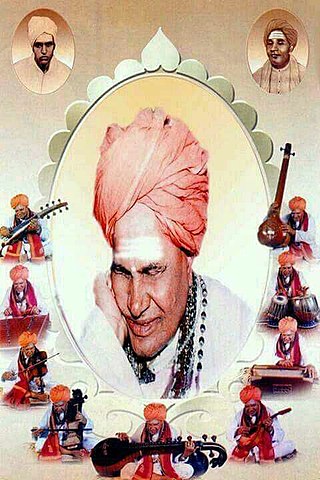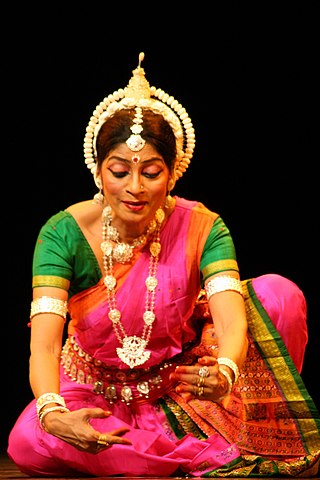
Sathya Sai Baba was an Indian guru and philanthropist. At the age of 14, he said he was the reincarnation of Shirdi Sai Baba and left his home saying "my devotees are calling me, I have my work."

Murlidhar Devidas Amte, popularly known as Baba Amte, was an Indian social worker and social activist known particularly for his work for the rehabilitation and empowerment of people suffering from leprosy. He has received numerous awards and prizes including the Padma Vibhushan, the Dr. Ambedkar International Award, the Gandhi Peace Prize, the Ramon Magsaysay Award, the Templeton Prize and the Jamnalal Bajaj Award. He is also known as the modern Gandhi of India.

Kelucharan Mohapatra was a legendary Indian classical dancer, guru, and exponent of Odissi dance, who is credited with the revival and popularizing of this classical dance form in the 20th century. He is the first person to receive the Padma Vibhushan from Odisha.

Hariharananda Giri, was an Indian yogi and guru who taught in India as well as in western countries. He was born as Rabindranath Bhattacharya in Nadia district, West Bengal. He was the head of the Kriya Yoga Institute, United States, and founder worldwide Kriya Yoga Centers. According to some sources, Hariharananda was a direct disciple of Yukteswar Giri.

The Aghori are a monastic order of ascetic Shaivite sadhus based in Uttar Pradesh, India. They are the only surviving sect derived from the Kāpālika tradition, a Tantric, non-Puranic form of Shaivism which originated in Medieval India between the 4th and 8th century CE.

Pratibha Ray is an Indian academic and writer of Odia-language novels and stories. For her contribution to the Indian literature, Ray received the Jnanpith Award in 2011. She was awarded the Padma Bhushan in 2022.

Sadhguru is an Indian guru and founder of the Isha Foundation, based in Coimbatore, India. The foundation, established in 1992, operates an ashram and yoga centre that carries out educational and spiritual activities. Sadhguru has been teaching yoga since 1982. He is the author of the New York Times bestsellers Inner Engineering: A Yogi's Guide to Joy and Karma: A Yogi's Guide to Crafting Your Destiny, and a frequent speaker at international forums.

Santhigiri Ashram is a spiritual center and pilgrimage site, located in Pothencode, Thiruvananthapuram District, Kerala, India. It was founded by Navajyothi Sree Karunakara Guru and is recognized and developed as a Social and Scientific Research Organization by the Government of India.

Dera Sacha Sauda is an Indian non-governmental organization described as a "religious cult" and "non-profit social welfare dera" that was established on 29 April 1948 by Mastana Balochistani, an ascetic follower of Baba Sawan Singh, as a centre for religious learning. After Baba Sawan Singh, the movement split into four groups, one of them led by Mastana Balochistani. After the death of Mastana Balochistani, his movement was split into three groups, with Shah Satnam Singh Ji also known as Param Pita Ji leading the Sirsa group, who then selected Gurmeet Ram Rahim to be his successor. Dera Sacha Sauda's main centre is situated in the city of Sirsa in Haryana state, northern India. The organisation has 46 ashrams (divisions) across India and other countries.

PanditPuttaraj Gawayigalu was an Indian musician in the Hindustani classical tradition, a scholar who authored more than 80 books in Kannada, Sanskrit and Hindi, a music teacher and a social servant. A member of the Gwalior Gharana (school), he is renowned for his ability to play many instruments such as the veena, the tabla, mridangam, violin etc., as well as for his popular renditions of devotional music (bhajans) vachanas.A famous vocalist both in Hindustani and Carnatic Music. He is the recipient of the Padma Bhushan, India's third highest civilian honour, awarded in 2010.
Aghor Yoga is a spiritual tradition that originated in Northern India around the 11th Century C.E. The word Aghor literally means "that which is not difficult or terrible"; according to its adherents, Aghor is a simple and natural state of consciousness, in which there is no experience of fear, hatred, disgust or discrimination. Accordingly, believers contend that any time that humans experience a state of discrimination, we limit our wholeness and fall prey to disruptive emotions such as anger, fear, jealousy, greed, and lust. The practices of Aghor Yoga today reflect reforms made in the 1960s, shifting the focus of Aghor to seeking a balanced life of selfless service and personal practice. Baba Bhagwan Ramji encouraged the practitioners of Aghor to follow the vamachara by embracing socially stigmatized and neglected people, such as street children and people with leprosy and other "untouchable" diseases. Today, the followers of Aghoreshwar Bhagwan Ramji have established a large network of schools, orphanages, medical clinics, or other social service projects.

Kailash Chandra Meher is an Indian artist, inventor, and social activist. He is a painter of contemporary modern art paintings and traditional Tussar Pattachitra paintings of Odisha. He was a recipient of the Padma Shri by the Government of India in 2013.
Kumkum Mohanty is an Odissi dancer.

Reela Hota is an Odissi dance performer, educator and producer, who has several performances to her credit. Daughter of Yoga Guru, Bijoylaxmi Hota and former bureaucrat Purna Chandra Hota, Reela was exposed to dance, yoga & ashram life since childhood. Having trained under the 3 doyens of Odissi dance, Guru Gangadhar Pradhan, Srimati Madhavi Mudgal and Guru Kelucharan Mohapatra, she inculcated perfect rhythm, sophistication, grace and presentation skills. A trend setter, Reela Hota pioneered in making Indian spiritual philosophy such as Yoga, Kundalini and Sanskrit the theme of her performances and is credited for adding a new dimension to Odissi Dance - the spiritual aspect.

Geeta Mahalik is an Indian Odissi dancer. The Government of India honoured her with the Padma Shri in 2014 for her services to the field of art and culture.
Wing Commander Kapil Singh, known as Pilot Baba, was an Indian spiritual guru and pilot with the Indian Air Force.
Sarathi Baba or Srimad Sarathi Dev is a self-proclaimed godman from Odisha, India, currently under investigation for fraud. On 4 August 2015, a TV channel, Prameya News7, ran a report of him being a charlatan. The channel claimed that he had stayed in a luxury hotel in Hyderabad with a young woman. The report also included images of him wearing a T-shirt and jeans. This triggered widespread protests in the state. He was arrested on 8 August 2015. As of September 2015, the state police is investigating various charges against him.
Darshan Lal Jain was an Indian social activist, who was awarded Padma Bhushan, India's third highest civilian award, in 2019 for his contribution in social work. He was known for educating young girls and financially troubled children.
Narasingha Prasad Guru is an author and a lyricist from the Indian State of Odisha. He is a pioneer and a promoter of the Koshali language, also known as the Sambalpuri language, which is a language spoken in the western parts of Odisha. He has composed over 10 books in this language and composed around 500 songs. He has also compiled a dictionary of the Koshali language.
Tara Jauhar is a writer and educationist from Delhi, India who has dedicated her life for disseminating the teachings of Sri Aurobindo who was an Indian philosopher, yoga guru, poet and nationalist who advocated a philosophy of life based on spiritual evolution. Tara Jauhar is the Chairman of the Sri Aurobindo Ashram, Delhi Branch which had been founded by her father Surendra Nath Jauhar in the year 1956. In the year 2022, Govt of India honored her with the Padma Shri award for her life long work dedicated to spreading the teachings of Sri Aurobindo.













